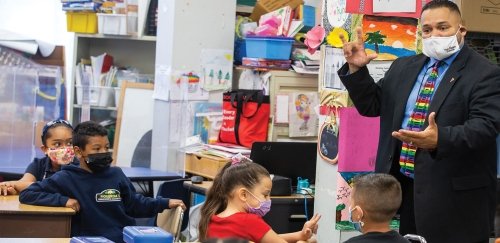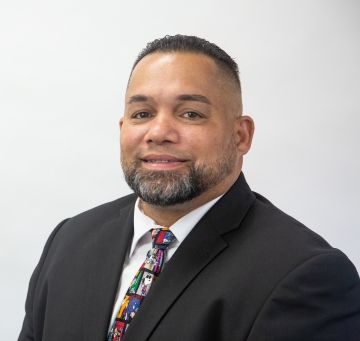"I am Providence students through and through. I am from the community."
- News & Events
- News
- "I am Providence students through and through. I am from the community."

An Alumni Q&A with Javier Montañez, M.Ed. ’03, Superintendent of Providence Public Schools
Pictured above: Superintendent Javier Montañez, M.Ed. ‘03 introduces himself to a class at Fortes Lima Elementary School during his first month on the job. Dr. Montañez demonstrates how to say “I love you” in sign language. (Photos by Suzanne Ouellette)
It wouldn’t be unfair to say that the superintendent’s office at 797 Westminster Street, home of the Providence Public School Department, has had a bit of a revolving door in recent years. When Javier Montañez, M.Ed. ’03 walked through that door last summer as interim superintendent (he has since been appointed to the job on a permanent basis), he brought with him something that none of his recent predecessors (and there have been many) could claim: experience in a Providence classroom.
Montañez’s story is impressive and has been documented in greater detail elsewhere, but here are the broad strokes: he grew up between Providence and New York City. His home life was so difficult that he moved out while he was still in his teens. At times he was homeless, sleeping in unlocked cars or at

Roger Williams Park. He liked school because it was where he knew he could get two hot meals, but he struggled to read because of his dyslexia and dropped out of high school.
Eventually Montañez earned his GED at Boricua College in New York and then earned both an associate and a bachelor’s degree there. He started a family, moved back to Providence and began teaching elementary school. He enrolled at Rhode Island College for his master’s degree and earned his doctorate at Johnson & Wales.
The Montañez children went to Providence public schools, while their father rose through the ranks. Montañez became principal at Leviton Dual Language School and, after the abrupt departure of his immediate predecessor, was tapped to become superintendent by Rhode Island Commissioner of Elementary and Secondary Education Angelica Infante-Green, who is leading the state intervention in Providence public schools.
Now this former classroom teacher has inherited one of the toughest jobs in the state; however, the early consensus seems to be that he’s up to the challenge.
You are a product of the Providence public school system in more ways than one: you’ve both attended and taught in them. What does it mean for students to see you in the superintendent’s chair?
First and foremost I would like to say that if I can do it, anybody can do it. I am Providence students through and through. I am from the community. I think students realize that if I’m capable of doing this, then they can ask themselves: what am I capable of doing, and what aspirations do I have?
I tell them, “I don’t want you to be like me, I need you to be better than me.” What I try to instill in them is to dream big and never stop dreaming and never let anyone deviate you from your dreams because you’re capable of doing anything and becoming anyone you want to be.
What does it mean for teachers to see someone who has worked, like them, in the classroom as superintendent?
I think there’s a sense of pride. They know that my nucleus is and always will be students. So, they know that the decisions I make will always be based on what is best for our children. They know that I’m an individual who they can have conversations with. I’m considered a teacher and an administrator.
What is one thing you brought from your teaching experience into the superintendent’s office that perhaps someone from a strictly administrative background might not have known?
When you’re in the classroom, you must be a facilitator. I think it’s really important that we move away from being teachers to being facilitators in the classroom. When you’re an administrator who has had experience in the classroom supporting students and making sure that they believe in themselves, you bring that with you and apply it to the whole building. It doesn’t mean that every strategy I’ve used is going to be the best, but when teachers know that you’re coming in with that knowledge, they tend to appreciate your suggestions.
What role did graduate school at RIC play in your professional development?
The practicum made a big difference for me. Not only was I learning the technical side of administration and the theories, I was actually putting it into practice when I went back into the schools. I really appreciate those courses because they prepared me for the next step in my career.
Why did you choose RIC?
One of the reasons I attended RIC was because it was in my backyard. I lived less than a half a mile away. I was a parent full-time, working full-time and going to school full-time. It was easier for me to stay within what I call home. I’m working for the community, I’m going to school within my community and Rhode Island College is well-known within our community.
What role do you think RIC can play in supporting Providence public schools?
RIC has been working as a partner with Providence schools for many, many years. We want to create a pipeline at multiple levels.
First, we’re looking at those students who want to become teachers who choose to go to RIC. How do we prepare them?
Then we need a program for those who are already in the Providence Public School Department, such as teacher assistants and instructional assistants. How do we prepare those who already have an associate or bachelor’s degree? How do we help them grow? We want to make sure that the program we put in place for them won’t be the same as someone starting the program new.
And then we have teachers who already have their bachelor’s degrees but want to expand in their profession or go into a master’s program. We want to make sure that they stay in Providence. We know that many individuals who graduate from RIC stay in Rhode Island, so we want to be able to grow our own from within.
We also need to prepare a pipeline in some of the hard-to-fill areas. We need an area focused on special education. That is a hard-to-fill position. We [need teachers for] multilingual learners. How do we fill those positions? And then science in high school and math in middle and high school, we need specialized teachers for those areas. These are the pipelines we need to create to make sure that we’re getting the best of the best and that they’re staying here with us.
